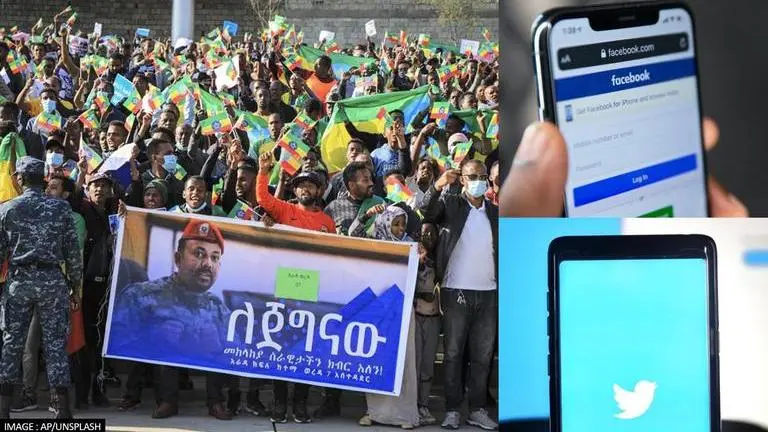Updated 23 November 2021 at 16:19 IST
Ethiopia: Why Facebook & Twitter facing scrutiny over inaction on hate speech amid crisis
As the conflict continues to tighten its grip in Ethiopia, social media giants Facebook and Twitter have drawn backlash over their respective roles amid crisis
- World News
- 5 min read

As the conflict continues to tighten its grip in Ethiopia, social media giants Facebook and Twitter have drawn backlash over their respective roles amid the crisis in the East African country. BBC cited critics saying that the social media platforms are not doing enough to prevent the spread of hate speech and violence-inciting content on the websites. However, the companies have rejected the allegation.
The media outlet noted that about 10% of the population in Ethiopia uses Facebook and overall, the internet population in the country remains relatively low. Additionally, there is a lack of broadband infrastructure in some of the areas in the East African nation. However, it is pertinent to state that social media is still widely used by Ethiopians staying in other nations. Even the Facebook posts by Ethiopian Prime Minister Abiy Ahmed regularly receives tens of thousands of likes and even thousands of shares.
What is happening in Ethiopia?
AP has stated that an estimated tens of thousands of people have died in the war between Ethiopian and allied forces and also the fighters from the country’s northern Tigray region. The forces from the Tigray region had dominated Ethiopia’s national government for a long time before Abiy took over the office. The conflict in the country has drawn a response from the US and other nations, who have raised concerns over Africa’s second-most populous country being fractured which would further destabilise the Horn of Africa.
The Tigray conflict is budded from generations-old tensions in the East African country which is made up of 10 regions and two cities. In November 2020, Ethiopia’s Nobel prize-winning Prime Minister Abiy had ordered a military offensive in the northern Tigray region and pledged that the conflict would be resolved swiftly. In the year that followed, the fighting caused the killing of hundreds of people and led to the displacement of over two million people away from their homes. The crisis triggered famine along with a fresh wave of atrocities.
Advertisement
While the nation was already struggling with socio-economic crisis, the feud between Abiy and the region’s former ruling party called the Tigray People's Liberation Front (TPLF), developed over into unrest, stated CNN. Presently the Ethiopian military had weakened in the recent months and has retreated from Tigray in June. But, the ethnic-based regional forces have been gearing up with Abiy’s government has called on all able citizens to join the fight.
Ethiopian PM on Monday chaired an executive meeting of the ruling Prosperity Party. Country’s Defence Minister Abraham Belay told state media that “all security forces will start taking special measures and tactics as of tomorrow.”
Advertisement
Where does social media come in?
While atrocities increasing, the Rights group Amnesty International has said that it noted a notable rise in social media posts amid the conflict that has incited violence and incorporated ethnic slurs. As per BBC, the group also said that many of these “have gone unchecked”. Just last month, Facebook, now known as Meta, whistleblower Frances Haugen said that the social media giant’s engagement-based algorithm “In places like Ethiopia, it's literally fanning ethnic violence."
Meanwhile, similar content was reported from Twitter. The British media outlet catalogued the posts on microblogging platforms such as the ones in support of a Tigrayan rebel group because it calls for violence against the Ethiopian PM. Other posts included the one by pro-Amhara Facebook account that called for “victory for Amhara people”.
BBC even stated that it found posts that were live for several weeks and were only deleted for violations after the outlet underscored them. But, the social media giant said that some of the flagged posts did not violate the policy and therefore, they were not removed. While some users were concerned with the platform not regulating the content, others felt that the companies were not fair on both sides.
How has Facebook and Twitter reacted?
As per BBC, Twitter had said that it has been monitoring the situation in Ethiopia and is committed to “protecting the safety of the conversation on Twitter”. Just earlier this month, Jack Dorsey-founded company had disabled the ‘Trends’ feature for Ethiopia that meant to show popular topics at any given time. It had said, “We hope this measure will reduce the risks of co-ordination that could incite violence or cause harm.” But even that measure drew fire from some of the pro-government accounts which said that the disabling of the feature occurred at the time the pro-government hashtag was among the top trends.
Meanwhile, Facebook has said that it has invested in safety and security measures in East African country for over two years and has also set up ways to detect hateful and inflammatory content posted in other languages such as Amharic, Oromo, Somali and Tigrinya. The UK media outlet quoted a Meta spokesperson as saying, “We have a dedicated team, which includes native language speakers, closely monitoring the situation on the ground, who are focused on making sure we're removing harmful content.” However, Facebook did not make it clear how many people were employed to review the content in the said languages.
(IMAGE: AP/Unsplash)
Published By : Aanchal Nigam
Published On: 23 November 2021 at 16:19 IST
